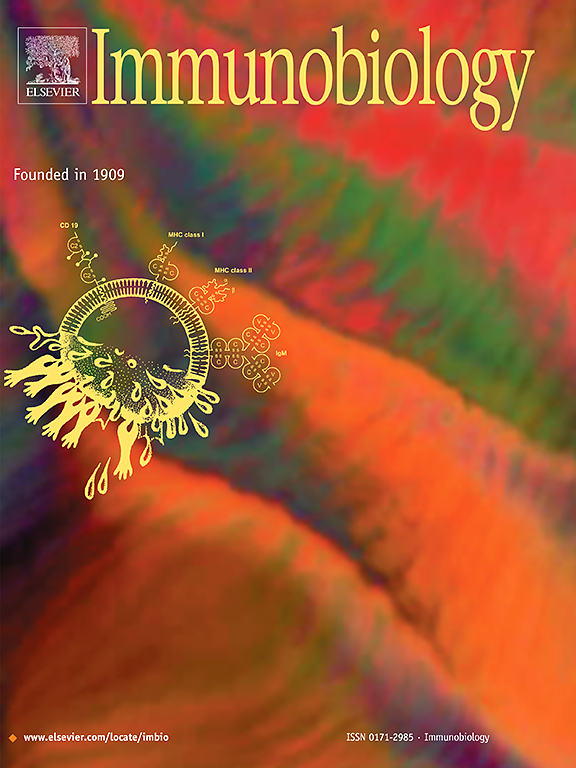USP14 promotes osteoarthritis progression by deubiquitinating FZD8 to activate the Wnt/β-catenin signaling pathway
IF 2.3
4区 医学
Q3 IMMUNOLOGY
引用次数: 0
Abstract
Background
Osteoarthritis (OA) is a chronic degenerative disease and associated with multiple pathogenic factors, such as old age, heredity, obesity, mechanical damage and inflammatory gene mutation. In this study, we aimed to explore the functions of ubiquitin specific peptidase 14 (USP14) in OA development.
Methods
The in vitro model of OA was constructed by stimulating chondrocytes with IL-1β. qRT-PCR and western blot assays were used for gene expression. MTT assay and EdU assay were manipulated to evaluate cell proliferation. Flow cytometry analysis was conducted for cell apoptosis. ELISA kits were utilized to determine the concentrations of inflammatory cytokines. Co-immunoprecipitation (Co-IP) assay and GST pull-down assay were manipulated to estimate the interaction between USP14 and Frizzled 8 (FZD8). Ubiquitination assay was used to evaluate the deubiquitination of FZD8.
Results
USP14 was highly expression in OA cartilage tissues and IL-1β-triggered chondrocytes. USP14 silencing aggravated the proliferation and repressed the apoptosis, inflammation and extracellular matrix (ECM) degradation of IL-1β-treated chondrocytes. USP14 could interact with FZD8 and regulate FZD8 expression through FZD8 deubiquitination. Moreover, FZD8 overexpression alleviated the effects of UPS14 silencing on IL-1β-treated chondrocyte proliferation, apoptosis, inflammation and ECM degradation. Additionally, USP14 knockdown inhibited Wnt/β-catenin signal pathway via the deubiquitination of FZD8.
Conclusion
USP14 repressed IL-1β-treated chondrocyte proliferation and promoted apoptosis, inflammation and ECM degradation by regulating FZD8 expression and Wnt/β-catenin signal pathway.

USP14通过去泛素化FZD8激活Wnt/β-catenin信号通路促进骨关节炎进展
骨关节炎(OA)是一种慢性退行性疾病,与衰老、遗传、肥胖、机械损伤、炎症性基因突变等多种致病因素有关。在这项研究中,我们旨在探讨泛素特异性肽酶14 (USP14)在OA发展中的功能。方法用IL-1β刺激软骨细胞,建立骨关节炎体外模型。采用qRT-PCR和western blot检测基因表达。采用MTT法和EdU法检测细胞增殖情况。流式细胞术检测细胞凋亡情况。ELISA试剂盒检测炎症细胞因子浓度。采用共免疫沉淀(Co-IP)法和GST下拉法测定USP14与frizzled8 (FZD8)之间的相互作用。用泛素化法评价FZD8的去泛素化作用。结果sus14在OA软骨组织和il -1β触发的软骨细胞中高表达。USP14沉默可增强il -1β处理的软骨细胞的增殖,抑制其凋亡、炎症和细胞外基质(ECM)降解。USP14可以与FZD8相互作用,通过FZD8去泛素化调控FZD8的表达。此外,FZD8过表达可减轻UPS14沉默对il -1β处理的软骨细胞增殖、凋亡、炎症和ECM降解的影响。此外,USP14敲低通过FZD8的去泛素化抑制Wnt/β-catenin信号通路。结论usp14通过调节FZD8表达和Wnt/β-catenin信号通路,抑制il -1β处理的软骨细胞增殖,促进细胞凋亡、炎症和ECM降解。
本文章由计算机程序翻译,如有差异,请以英文原文为准。
求助全文
约1分钟内获得全文
求助全文
来源期刊

Immunobiology
医学-免疫学
CiteScore
5.00
自引率
3.60%
发文量
108
审稿时长
55 days
期刊介绍:
Immunobiology is a peer-reviewed journal that publishes highly innovative research approaches for a wide range of immunological subjects, including
• Innate Immunity,
• Adaptive Immunity,
• Complement Biology,
• Macrophage and Dendritic Cell Biology,
• Parasite Immunology,
• Tumour Immunology,
• Clinical Immunology,
• Immunogenetics,
• Immunotherapy and
• Immunopathology of infectious, allergic and autoimmune disease.
 求助内容:
求助内容: 应助结果提醒方式:
应助结果提醒方式:


